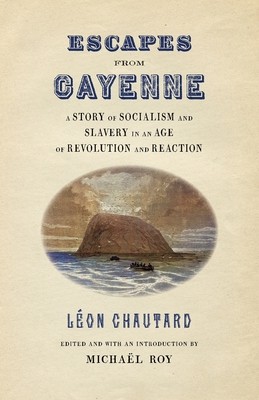
- We will send in 10–14 business days.
- Author: Michaël Roy
- Publisher: University of Georgia Press
- ISBN-10: 0820364800
- ISBN-13: 9780820364803
- Format: 14 x 21.6 x 0.9 cm, minkšti viršeliai
- Language: English
- SAVE -10% with code: EXTRA
Reviews
Description
In September 1857, Léon Chautard, Charles Bivors, and Hippolyte Paon arrived in Salem, Massachusetts. These refugees from the French Revolution of 1848 were "homeless, penniless, friendless, strangers in a strange land, among a people of strange speech," as one of their advocates, the abolitionist William Lloyd Garrison, later put it. The only thing they had was a story to tell--an affecting, yet thrilling story of revolutionary upheaval, forced exile, and hairbreadth escapes over three continents.
Following the June Days uprising in Paris, the three French socialists had been transported first to Algeria, then to Cayenne. After years of hard labor, they had escaped the penal colony and made their way to the United States via British Guiana. These experiences brought them into close contact with the colonial frontiers and slave societies of the Americas. In Salem, Chautard soon published an account of their trials under the title Escapes from Cayenne (1857). His pamphlet, which has long sunk into oblivion, deserves rediscovery. Escapes from Cayenne sheds light on the ideological connections between the European "spirit of 1848" and U.S. radical abolitionism and reveals the scope of cosmopolitan solidarities available to fugitives of different national and racial origins in the mid-nineteenth-century Atlantic world. Written in English by a Frenchman, and reminiscent of literary traditions such as the slave narrative and the picaresque novel, it is a tale of adventure as well as a passionate cri de coeurfor universal justice.EXTRA 10 % discount with code: EXTRA
The promotion ends in 22d.18:17:10
The discount code is valid when purchasing from 10 €. Discounts do not stack.
- Author: Michaël Roy
- Publisher: University of Georgia Press
- ISBN-10: 0820364800
- ISBN-13: 9780820364803
- Format: 14 x 21.6 x 0.9 cm, minkšti viršeliai
- Language: English English
In September 1857, Léon Chautard, Charles Bivors, and Hippolyte Paon arrived in Salem, Massachusetts. These refugees from the French Revolution of 1848 were "homeless, penniless, friendless, strangers in a strange land, among a people of strange speech," as one of their advocates, the abolitionist William Lloyd Garrison, later put it. The only thing they had was a story to tell--an affecting, yet thrilling story of revolutionary upheaval, forced exile, and hairbreadth escapes over three continents.
Following the June Days uprising in Paris, the three French socialists had been transported first to Algeria, then to Cayenne. After years of hard labor, they had escaped the penal colony and made their way to the United States via British Guiana. These experiences brought them into close contact with the colonial frontiers and slave societies of the Americas. In Salem, Chautard soon published an account of their trials under the title Escapes from Cayenne (1857). His pamphlet, which has long sunk into oblivion, deserves rediscovery. Escapes from Cayenne sheds light on the ideological connections between the European "spirit of 1848" and U.S. radical abolitionism and reveals the scope of cosmopolitan solidarities available to fugitives of different national and racial origins in the mid-nineteenth-century Atlantic world. Written in English by a Frenchman, and reminiscent of literary traditions such as the slave narrative and the picaresque novel, it is a tale of adventure as well as a passionate cri de coeurfor universal justice.

Reviews